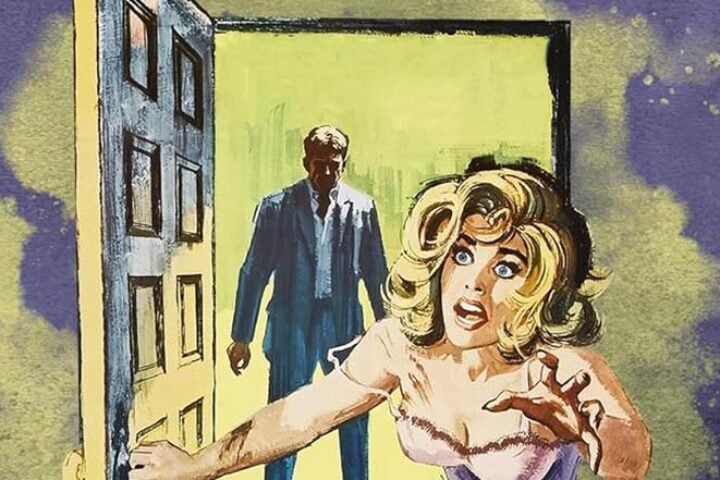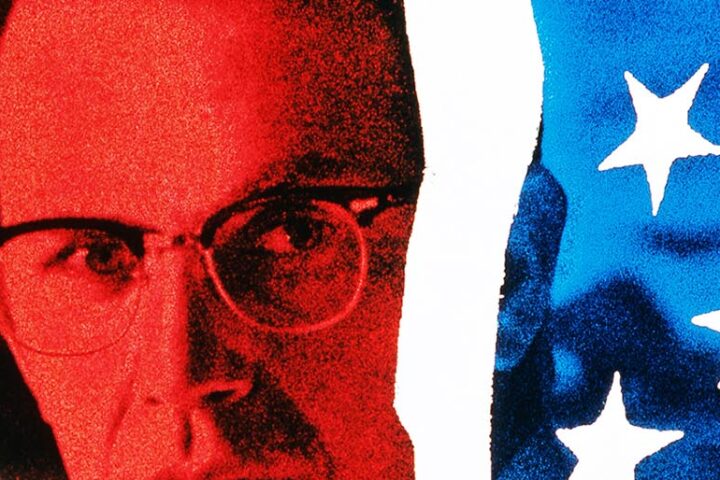Near the end of Billy Wilder’s Witness for the Prosecution, after the central court case seems all but completely settled, senior barrister Sir Wilfrid Robarts (Charles Laughton) contemplates the surprising evidence that’s just been presented. “It’s a little too neat, too tidy, and altogether too symmetrical,” he remarks. It’s a comment that begs to be read through the lens of Wilder’s own wry approach to filmmaking, which often feels throughout his canon like an alchemic combination of effortless story execution, pinpoint humor, and acting masterclass.
Wilder effects an outward feeling of wily and out of control scenarios that are running like well-oiled machines within. The ending of Witness for the Prosecution exemplifies this by throwing its characters’ preceding buttoned-up decorum out of whack, as they race through a procession of sudden revelations that contain a clear logic and purpose. But per Wilder’s wont, the film concludes by oscillating between the machinations of a riveting thriller and the tonal undercurrent of a black comedy, troubling any simple sense of resolution.
Adapted from Agatha Christie’s 1953 play of the same name, the film contains an ample amount of knotty plotting and elaborate exposition, but these details aren’t the primary reason for its existence. For Wilder and co-writer Harry Kurnitz, the fun resides in conceiving bits of business that give characters unique and sardonic depth. Take Robarts, who at the start of Witness for the Prosecution has just come out of a coma following a heart attack (a detail not found in Christie’s play). Riding in the back of a car with Miss Plimsoll (Elsa Lanchester), his private nurse, Robarts looks as if he’d rather be dead. As the sequence unfolds, Robarts scowls about not being allowed to smoke cigars or have a glass of brandy—a running gag throughout the film, as the quipping, grimacing barrister sneakily works his way toward indulging in both.
Yet the barrister is also a principled Englishman who believes in justice and a fair shake, which is why he’s compelled, despite his ailing health, to lead the defense for Leonard Vole (Tyrone Power), who’s been accused of murdering a childless widow, Emily French (Norma Varden), in order to claim a sizeable amount of inheritance money. Enter Christine Vole (Marlene Dietrich), Leonard’s wife, who punches a host of holes in Leonard’s defense, eventually taking the stand, per the film’s title, in order to try and put him behind bars.
Structurally, Witness for the Prosecution takes its time by steadily establishing relationships through flashbacks involving Leonard, first to his initial interactions with Emily, then to his meeting Christine in Germany shortly after WWII. Geopolitics and legal minutiae play a role here as well: Turns out, Christine was actually married to a man living in the Russian zone of East Germany, so her marriage to Leonard was illegal, thus making her capable of testifying against him (were they married, she wouldn’t be obligated to, per British law). These scenes prove the most slack, as they’re too protracted and rather obviously exist as questionable, subjective recollections, given that they’re all from Leonard’s increasingly dubious perspective.
Despite an array of enticing details and thematic components, Witness for the Prosecution works best when it’s focused on how Robarts engages with those around him in a variety of settings. Laughton gives him such a cunning presence as a whip-smart legal mind and a fiend for minor indulgences that certain details of the plot get swallowed up by the actor’s imposing and often hilarious presence. Laughton is so funny, in fact, that some of the more serious revelations toward the end involving numerous betrayals play forced and difficult to take especially seriously. The final scene—an obvious product of the Hays Code—makes it easy for one to want for a more agonizing ending. Nevertheless, Witness for the Prosecution remains vintage Wilder for its acidic sense of humor and its certainty that death, however it comes, will never be quite as ceremonious or as simple as one might have hoped.
Image/Sound
Kino Lorber’s 1080p transfer is sourced from the same master as the distributor’s 2014 Blu-ray release of Witness for the Prosecution. Though this transfer is better encoded, viewers may be left wanting for a 2K or 4K restoration, as that would have brought the film’s intricate sense of visual detail to even greater life. Still, this is a sturdy presentation. The contrast ratio is strong, which is especially notable in some of the moodier scenes set outside of the courtroom. Grain remains consistent and even, while black levels are striking. There’s the occasional bit of damage and debris on the image, but only a stickler for perfection will be bothered. The 2.0 DTS-HD audio track offers clear dialogue and a clean mix of Matty Malneck’s score.
Extras
The main addition to Kino’s reissue is a commentary track by professor and author Joseph McBride, who’s become the go-to commentator on Billy Wilder’s work. McBride has a wealth of knowledge on Witness for the Prosecution’s production, reception, and themes, and, thankfully, he’s also candid regarding some things that he doesn’t care for about the film. Most notably, McBride takes issue with the casting of Tyrone Powers rather than a younger, British actor, such as Laurence Harvey or Roger Moore, in the role of Leonard Vole. One can’t help but see McBride’s point, as a boyish face would have provided greater contrast to Laughton’s wizened barrister. Also included is a brief clip of Wilder discussing the film with filmmaker Volker Schlöndorff and 13 trailers for Wilder films, including one for Witness for the Prosecution.
Overall
Part curmudgeonly comedy, part courtroom nailbiter, and all Billy Wilder: Witness for the Prosecution is back in print on a stellar Blu-ray from Kino Lorber.
Since 2001, we've brought you uncompromising, candid takes on the world of film, music, television, video games, theater, and more. Independently owned and operated publications like Slant have been hit hard in recent years, but we’re committed to keeping our content free and accessible—meaning no paywalls or fees.
If you like what we do, please consider subscribing to our Patreon or making a donation.



